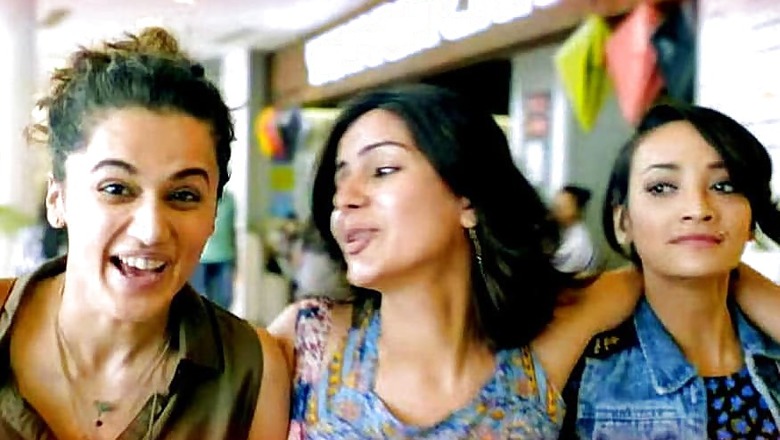
views
Cast: Taapsee Pannu, Amitabh Bachchan, Andrea Tariang, Kirti Kulhari, Angad Bedi
Director: Aniruddha Chowdhury
Pink begins and opening credits roll in, a muted conversation plays in the background. Pleasantries are exchanged, polite laughter spurred with someone suggesting to call it a night. A drink is offered, last drink is resisted and then everything goes silent only to open to the first scene where three girls, troubled and visibly shaken and travelling in cab while three men rush to the hospital with one bleeding from one eye.
Right from its first scene, Pink establishes the plot effectively without really showing the actual incident. In fact the said incident, on which the entire film is based, is never really shown but director Aniruddha Roy Chowdhury’s able direction and writer Ritesh Shah’s clever writing makes the viewer imagine what could have happened on that fateful night.
The plot is basic. Three roommates go to a concert and meet three men- one being an old school friend- and decide to continue with the fun just a bit more post-concert. The men invite them to the resort they are staying at, offer drinks and dinner and try to force themselves on them only to be left injured by one of the girls.
While the women, Minal (Taapsee Pannu), Falak (Kirti Kulhari) and Andrea(Andrea Tariang) are deeply affected by that night, they get on with their life the morning after. The three share a home in a plush locality in South Delhi where unwanted attention comes their way almost every day. A peering neighbor would always be staring towards their balcony, a car would slowdown as they pass by at night.
Things only begin to worsen when the three are individually attacked. Minal, the feisty one, who had actually broken a glass bottle on Rajveer’s (Angad Bedi) head that night, is molested in a moving car by his friends- including one who just wants to take revenge for his friend despite of not being present on that night. And despite being shaken and muttering a sorry during the assault, Minal remains unapologetic about what she did to save herself and her friends. Falak, the more matured of the lot, gets fired from her work place because a morphed obscene photo of her's reaches her boss’s mailbox and Andrea, the timid one, from ‘Northeast’ gets chased by a car with tinted windows.
Soon enough multiple charges are slapped on the girls because, the men, predictably enough are from an influential family. Their neighbor, Deepak Sehgal, a retired lawyer- a man with bi-polar disorder comes to their rescue. And most of the second half of the film is spent in courtroom where charges like prostitution and attempt to murder are very casually put on the women because they were seen drinking and wearing questionable clothes that night.
The director takes liberty of silences in the first half to establish the grim situation which is absolutely a contrast to the high drama that ensues inside the court room in the later part of the film. And with powerful lines and sharp acting by the entire cast, the director manages to raise some very pertinent issues about how we deal cases related to rape and molestation. Heck, it even raises the point about how we always end up marginalizing the people who come from the north eastern part of the country. That they are always ‘easy’ – which as Andrea states how difficult it is for women from that part of the country to survive in capital-constantly being judged.
The court room scenes flow easily with clever lines- Bachchan, at one point, objects to one of the men’s ‘overacting’ as he gives his side of the story at the witness box. Then the moment where Falak simply becomes tired of being accused of taking money and admits to it and further questions that ‘So what?’ makes for a very powerful scene.
The three actresses are very aptly cast and all of them fit their parts brilliantly. There is a spark in Pannu’s way of saying at one point that if it ever has to happen again to her she wouldn’t shy away from breaking another bottle. There is that amount of helplessness when Falak’s personal life is discussed openly in the courtroom and you feel Andrea’s pain for being labeled so easily.
Among the men, Vijay Verma as the unsolicited friend who wants to take revenge on his friend’s behalf shines in his part. Angad Bedi as Rajveer, a person who takes his family name too seriously, gets the North-Indian chauvinist man’s part well. And manages to hold his own in the court room scenes which has so much for Piyush Mishra and Amitabh Bachchan to do. Bachchan, meanwhile, swells mostly in his role as the bipolar lawyer who has his own troubles at home ( an ailing wife, a disorder to deal with) and yet comes to fight for the three. He does ham a bit in some scenes where he is trying to be the mysterious, creepy neighbour.
Of course, the film isn’t devoid of flaws. A lot of things remain unexplained. Why does Falak not fight it out with her boss when she is fired? How does Bachchan so easily overcome his disorder remains unexplained.
With interesting cameos from Mamata Shankar, Vinod Nagpal and Dhritiman Chatterjee, the film overcomes these flaws and creates for a compelling story.
Most importantly, the film highlights a simple truth that most men never get. A ‘No' is always a ‘No’. It never means an ‘Yes’.
Pink is perhaps the most relevant film of recent times. And it is not to be missed by anyone.
Rating: 4/5



















Comments
0 comment